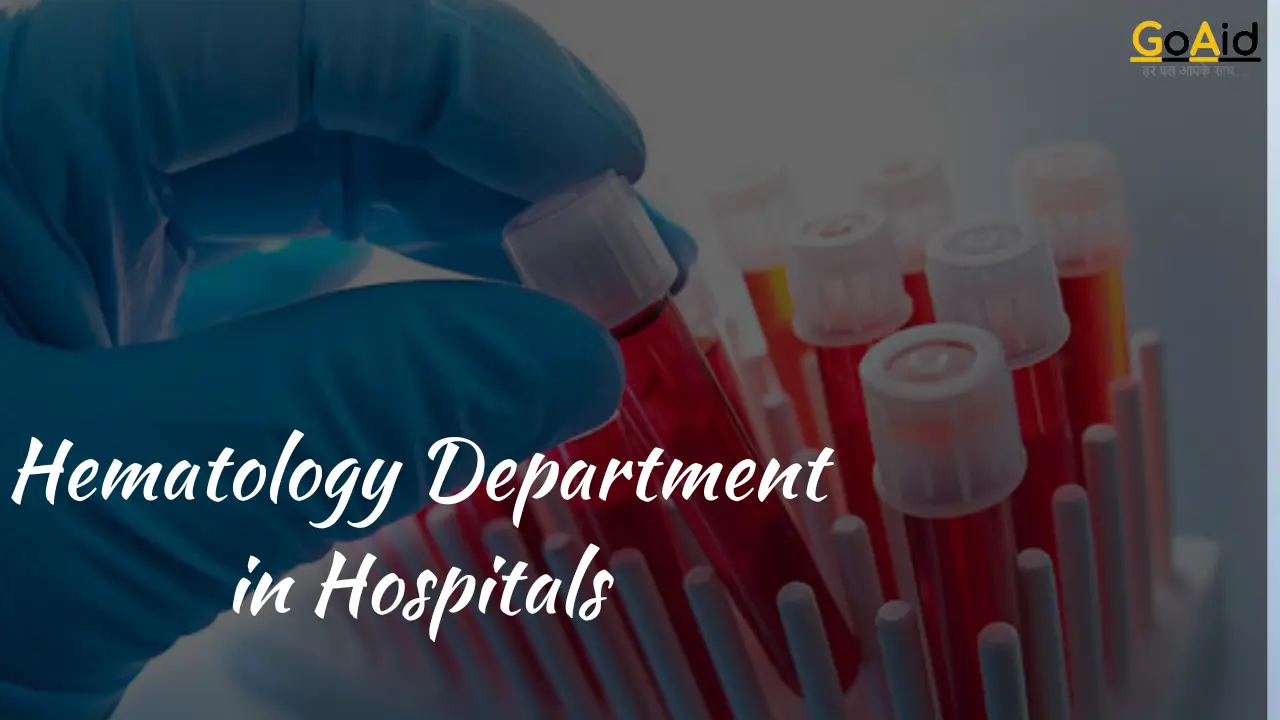Not only in India but in the entire world, some people are suffering from problems related to their blood. Sometimes these problems become critical and instant medical intervention becomes needed. However, there are very few people who know about this thing, but there is a dedicated ward, unit, or department in hospitals that mainly treats the problems related to blood. This department is known as the hematology department in hospitals. This department helps patients concerned with blood-related disorders, such as anemia, leukemia, and clotting issues.
If you are also one of those who have very little idea about the Hematology Department in Hospitals or have no idea about this hospital department, then in this blog, we have explained every component of this department by mentioning each of them in this blog. This underscores the meaning of Hematology, what is the Hematology Department in Hospitals? Roles and responsibilities of this department, features, and specifications of this department, disorders that got treated in this department, essential equipment used in this department also how to choose the best Hematology Department Hospital in India. Are you excited to know about all of this information? If yes, then read this blog to the end.
So, letŌĆÖs start:
Complete Guide to the Hematology Department in Hospital
We have explained every component of this Hematology Department in Hospitals in this blog. We have mentioned and explain these components that will help you to gather all the information about this Hematology Department in Hospitals completely.
What is the Hematology Department in the Hospital? ŌĆō What does Hematology mean?
The Hematology Department focuses on disorders related to blood cells and coagulation processes. The term Hematology, derived from the Greek word “haima” meaning blood, encompasses a wide range of conditions including anemia, leukemia, hemophilia, thrombocytopenia, and other blood-related disorders. This department is vital for diagnosing diseases that affect blood production or function.
In a hospital setting, hematologists conduct comprehensive evaluations using blood tests such as complete blood counts (CBC), bone marrow biopsies, and coagulation studies to diagnose hematological conditions accurately. Treatment options vary widely depending on the diagnosis, they may include blood transfusions for anemia or platelets for thrombocytopenia, chemotherapy for malignancies like leukemia or lymphoma, or targeted therapies for specific blood disorders.
The Hematology department plays a crucial role in managing complex cases involving multiple comorbidities where blood disorders can complicate overall health outcomes. Hematologists often work closely with other specialists in multidisciplinary teams to provide holistic care tailored to individual patient needs. Furthermore, this department is actively involved in research aimed at understanding blood disorders better and developing innovative treatment strategies. By focusing on both clinical excellence and research initiatives, the Hematology Department significantly enhances patient care and outcomes within healthcare settings.
Roles and Responsibilities in Hematology Department in Hospitals
The Hematology Department, specializing in blood disorders management plays a vital role within hospitals by diagnosing conditions affecting blood cells’ function while ensuring optimal patient outcomes through specialized care delivery models tailored accordingly.
1. Diagnosis of Blood Disorders
Hematologists conduct comprehensive evaluations utilizing blood tests such as complete blood counts (CBC) alongside bone marrow biopsies aimed at accurately diagnosing various hematological conditions impacting overall health status.
Also Read: Endocrinology Department in Hospitals
2. Management of Anemia
This department develops personalized treatment plans addressing anemia cases employing iron supplementation transfusions alongside erythropoietin-stimulating agents designed specifically according to individual patients’ needs identified during assessments.
3. Treatment of Malignancies
Hematology departments manage blood cancers like leukemia lymphoma utilizing chemotherapy-targeted therapies ensuring effective disease control while minimizing adverse effects associated with conventional treatment methods employed traditionally.
4. Coagulation Disorders Management*
Hematologists specialize in assessing coagulation disorders and implementing appropriate interventions including anticoagulation therapy monitoring protocols designed specifically to mitigate thromboembolic risks associated with these conditions effectively.
5. Patient Education Programs
Educating patients regarding their blood disorders is crucial hematology specialists provide guidance concerning disease processes and available treatment options emphasizing the importance of adherence to prescribed regimens and achieving optimal outcomes.
Read More: Psychiatry Department in Hospitals
6. Collaboration with Other Specialists
Hematology departments collaborate closely with other specialties ensuring comprehensive management of complex cases involving comorbidities requiring interdisciplinary approaches to enhance overall quality delivered throughout the healthcare system.
7. Research Contributions
Many hematologists engage actively in research initiatives aimed at advancing knowledge and understanding blood disorders developing innovative therapies improving existing protocols utilized within clinical practice settings effectively.
8. Transfusion Medicine Oversight
This department oversees transfusion medicine practices ensuring the safe administration of blood products compliance with established guidelines minimizing risks associated with transfusions effectively safeguarding patient welfare throughout the process involved.
9. Quality Improvement Initiatives
Hematology teams participate actively in quality improvement initiatives focused on enhancing safety protocols optimizing processes delivering high-quality care consistently across all levels provided throughout the organization effectively.
10. Community Outreach Efforts
Hematology departments often engage in community outreach efforts promoting awareness regarding blood disorders alongside educational workshops aimed at enhancing public understanding related to hematological health matters effectively.
Know More: Top 10 Private and Government Hospitals in Rajasthan
Features and Specialities of the Hematology Department
The Hematology Department, specializing in blood disorders management plays a vital role in hospitals diagnosing conditions affecting blood cell function ensuring optimal patient outcomes through specialized care delivery models tailored accordingly.
1. Diagnosis Blood Disorders Expertise
Hematologists conduct comprehensive evaluations utilizing blood tests complete blood counts (CBC) bone marrow biopsies accurately diagnosing various hematological conditions impacting overall health status encountered successfully achieved consistently.
2. Management Anemia Cases Offered Services
This department develops personalized treatment plans addressing anemia cases employing iron supplementation transfusions and erythropoietin-stimulating agents designed specifically according to individual patients’ needs identified assessments were conducted efficiently achieved successfully.
3. Treatment Malignancies Provided
Hematology departments manage blood cancers leukemia lymphoma utilizing chemotherapy-targeted therapies ensuring effective disease control and minimizing adverse effects associated with conventional methods employed traditionally encountered successfully.
4. Coagulation Disorders Management Expertise Available
Hematologists specialize in assessing coagulation disorders and implementing appropriate interventions including anticoagulation therapy monitoring protocols designed specifically to mitigate thromboembolic risks associated with these conditions effectively encountered successfully.
Also Read: Top 10 Neurology Hospitals in Jaipur
5. Patient Education Programs Offered
Educating patients regarding their blood disorders crucial hematology specialists provide guidance concerning disease processes and available treatment options emphasizing the importance of adherence to prescribed regimens to achieving optimal outcomes efficiently encountered successfully.
6. Collaboration Other Specialists Engaged
Hematology departments collaborate closely with other specialties ensuring comprehensive management of complex cases involving comorbidities requiring interdisciplinary approaches enhancing overall quality delivered throughout the healthcare system efficiently encountered successfully.
7. Research Contributions Engagements
Many hematologists engage actively in research initiatives aimed at advancing knowledge and understanding blood disorders developing innovative therapies improving existing protocols utilized in clinical practice settings effectively encountered successfully.
8. Transfusion Medicine Oversight Provided
This department oversees transfusion medicine practices ensuring the safe administration of blood products compliance with established guidelines minimizing risks associated with transfusions effectively safeguarding patient welfare throughout the process involved.
9. Quality Improvement Initiatives Engaged
Hematology teams participate actively in quality improvement initiatives focused on enhancing safety protocols optimizing processes delivering high-quality care consistently across all levels provided throughout the organization efficiently encountered successfully.
10. Community Outreach Efforts Participated
Hematology departments often engage in community outreach efforts promoting awareness regarding blood disorders alongside educational workshops aimed at enhancing public understanding related to hematological health matters efficiently encountered successful.
Also Read: Top 10 Private Hospitals in India
What treatment is provided in the Hematology Department?
The Hematology Department provides specialized treatment for a wide range of blood disorders, including anemia, leukemia, and hemophilia. This department focuses on diagnosing, managing, and treating conditions that affect blood components and their functions.
1. Anemia
Anemia is a condition characterized by a deficiency of red blood cells or hemoglobin, leading to fatigue, weakness, and shortness of breath. It can result from nutritional deficiencies, chronic diseases, or bone marrow disorders.
- Treatment may include iron supplements or vitamin B12 injections.
- Blood transfusions are administered in severe cases to restore hemoglobin levels.
- Erythropoietin-stimulating agents may be prescribed to boost red blood cell production.
- Dietary modifications are recommended to enhance nutrient intake.
- Regular monitoring through Hematology significant tests helps track treatment effectiveness.
2. Leukemia
Leukemia is a type of cancer that affects the bone marrow and blood, leading to the overproduction of abnormal white blood cells. Symptoms include frequent infections, fatigue, and easy bruising.
- Treatment typically involves chemotherapy to target cancerous cells.
- Targeted therapies may be used based on specific genetic mutations.
- Bone marrow or stem cell transplants can provide curative options for some patients.
- Supportive care includes managing side effects and complications from treatments.
- Continuous monitoring through Hematology tests ensures appropriate adjustments to therapy.
Read More: Top 10 Pediatric Hospitals in Jaipur
3. Hemophilia
Hemophilia is a genetic disorder that impairs the bodyŌĆÖs ability to make blood clots, leading to excessive bleeding. Patients may experience spontaneous bleeding episodes or prolonged bleeding after injury.
- Treatment involves regular infusions of clotting factor concentrates.
- Prophylactic therapy may be recommended to prevent bleeding episodes.
- Education on injury prevention and management of bleeding is provided.
- Physical therapy may be included to strengthen muscles and joints.
- Regular follow-ups in the hospital Hematology room ensure ongoing care.
4. Thrombocytopenia
Thrombocytopenia is characterized by low platelet counts, which can lead to an increased risk of bleeding and bruising. Causes may include bone marrow disorders or autoimmune diseases.
- Treatment options include corticosteroids to increase platelet production.
- Platelet transfusions may be necessary in severe cases.
- Addressing underlying causes, such as discontinuing certain medications, is essential.
- Monitoring through Hematology significant tests helps track platelet levels.
- Patient education on avoiding activities that increase bleeding risk is provided.
5. Lymphoma
Lymphoma is a cancer of the lymphatic system that can cause swollen lymph nodes, fever, and weight loss. It includes Hodgkin and non-Hodgkin lymphoma types.
- Treatment often involves chemotherapy and radiation therapy.
- Targeted therapies are utilized based on specific lymphoma characteristics.
- Stem cell transplantation may be considered for relapsed cases.
- Regular imaging studies are conducted to assess treatment response.
- Supportive care focuses on managing symptoms and improving quality of life.
Also Read: Nephrology Department in Hospitals
6. Myeloma
Multiple myeloma is a cancer that develops from plasma cells in the bone marrow, leading to bone damage and immune system impairment. Symptoms include bone pain and anemia.
- Treatment typically includes chemotherapy and targeted therapies like proteasome inhibitors.
- Stem cell transplantation can be a curative option for eligible patients.
- Bisphosphonates are used to manage bone health and prevent fractures.
- Regular monitoring through blood tests assesses disease progression and treatment response.
- Supportive care includes pain management strategies.
7. Sickle Cell Disease
Sickle cell disease is a genetic disorder that causes abnormal hemoglobin, leading to distorted red blood cells that can block blood flow. Symptoms include pain crises and anemia.
- Treatment focuses on managing pain episodes with analgesics.
- Hydroxyurea may be prescribed to reduce the frequency of crises.
- Blood transfusions help manage severe anemia and prevent complications.
- Regular health check-ups in the Hematology ward in hospitals ensure comprehensive care.
- Patient education emphasizes hydration and avoiding triggers for pain crises.
8. Polycythemia Vera
Polycythemia vera is a blood disorder characterized by an overproduction of red blood cells, increasing the risk of thrombosis. Symptoms may include headaches and dizziness.
- Treatment involves phlebotomy to reduce red blood cell mass.
- Medications like hydroxyurea may be used to control cell production.
- Regular monitoring through Hematology tests helps track blood counts and adjust treatment as needed.
- Lifestyle modifications are encouraged to reduce cardiovascular risks.
Know More: Gastroenterology Department in Hospitals
9. Aplastic Anemia
Aplastic anemia occurs when the bone marrow fails to produce sufficient blood cells, leading to fatigue, increased risk of infections, and bleeding problems.
- Treatment options include immunosuppressive therapy or stem cell transplantation for severe cases.
- Supportive care involves transfusions for low blood counts as needed.
- Medications may be prescribed to stimulate bone marrow function.
10. Thrombosis
Thrombosis refers to the formation of blood clots within blood vessels, which can lead to complications like deep vein thrombosis (DVT) or pulmonary embolism (PE).
- Anticoagulation therapy is the primary treatment approach for preventing clot formation.
- Thrombolytic therapy may be used in acute cases to dissolve clots quickly.
- Lifestyle modifications are recommended to reduce risk factors associated with thrombosis.
Essential Equipment used in the Hematology Department
The Hematology Department is equipped with specialized instruments and devices essential for diagnosing, analyzing, and treating blood-related disorders. This equipment plays a critical role in ensuring accurate test results and effective patient management.
1. Hematology Analyzers
Hematology analyzers are automated machines that perform complete blood counts (CBC) and analyze various blood components. They are crucial for diagnosing anemias, infections, and other blood disorders.
- Provides rapid results for multiple blood parameters.
- Can perform differential white blood cell counts automatically.
- Essential for monitoring disease progression and treatment effectiveness.
Know More: Dermatology Department in Hospitals
2. Centrifuge
A centrifuge is used to separate blood components by spinning samples at high speeds. It is essential for preparing specimens for further analysis.
- Separates plasma from red blood cells for testing.
- Used in preparing samples for erythrocyte sedimentation rate (ESR) tests.
- Essential for concentrating cells for microscopic examination.
3. Automatic Erythrocyte Sedimentation Rate (ESR) Analyzer
This equipment measures the rate at which red blood cells settle in a tube over time, providing valuable information about inflammation in the body.
- Automates the ESR testing process for efficiency and accuracy.
- Provides quick results that aid in diagnosing inflammatory diseases.
- Reduces human error associated with manual ESR readings.
4. Blood Culture Systems
Blood culture systems are used to detect the presence of bacteria or fungi in the bloodstream, crucial for diagnosing infections such as sepsis.
- Automatically monitors samples for microbial growth.
- Provides timely results to guide antibiotic therapy.
- Essential for identifying pathogens responsible for bloodstream infections.
5. Slide Stainers
Slide stainers automate the process of preparing and staining blood smears, allowing for detailed microscopic examination of blood cells.
- Ensures consistent staining quality across samples.
- Increases throughput by processing multiple slides simultaneously.
- Facilitates accurate identification of abnormal cell morphology.
6. Coagulation Analyzers
Coagulation analyzers measure how long it takes for blood to clot, which is vital for diagnosing bleeding disorders and monitoring anticoagulation therapy.
- Provides results for prothrombin time (PT) and activated partial thromboplastin time (aPTT).
- Essential for managing patients on anticoagulant medications.
- Helps assess the risk of thromboembolic events.
7. Flow Cytometer
A flow cytometer analyzes the physical and chemical characteristics of cells in a fluid as they pass through a laser beam, crucial for diagnosing hematological malignancies.
- Measures cell size, complexity, and fluorescence to identify different cell types.
- Used in diagnosing leukemias and lymphomas.
- Provides quantitative data on cell populations in a sample.
Read More: The Challenges of Rural Ambulance Services in India
8. Microscope
A microscope is essential for examining blood smears to identify abnormalities in cell morphology, such as those found in various hematological conditions.
- Allows detailed visualization of red and white blood cells.
- Used to confirm diagnoses based on analyzer results.
- An essential tool in research settings for studying blood disorders.
9. Weighing Equipment
Weighing equipment is necessary for preparing reagents and samples accurately within the hematology laboratory. It ensures precise measurements are maintained during testing procedures.
- Used to weigh substances required for reagent preparation.
- Ensures consistency and accuracy in laboratory protocols.
- Integral to maintaining quality control standards within the lab.
10. Hot Air Oven
A hot air oven is used primarily for sterilizing laboratory equipment and glassware by dry heat, ensuring that all tools are free from contaminants before use.
- Maintains sterility of instruments used in hematological procedures.
- Essential for drying glassware after cleaning.
- Regularly monitored to ensure proper temperature settings during sterilization cycles.
How to Choose the Best Hematology Hospital in India?
Selecting the most suitable hospital for hematology treatment is essential for the effective management of blood disorders, including conditions like anemia, leukemia, and lymphoma. Factors such as medical expertise, technology, and patient support services play a significant role in determining the quality of care provided in the Hematology department.
1. Investigate Hospital Reputation
Begin by researching the hospital’s reputation in treating hematological conditions. Look for institutions recognized for their Hematology Services in Hospitals, paying attention to patient feedback and success rates in managing blood-related diseases.
- Read online reviews and testimonials from former patients.
- Seek recommendations from healthcare professionals or support groups.
- Check for the hospital’s accreditation and its standing in the field of hematology.
2. Assess Medical Expertise
Ensure that the hospital employs qualified hematologists who specialize in various blood disorders. The proficiency of the medical team is crucial for accurate diagnosis and effective treatment.
- Look for board-certified hematologists with substantial experience in treating blood cancers.
- Review the qualifications and training of healthcare providers within the hematology department.
- Consider hospitals that utilize a multidisciplinary approach to patient care.
3. Evaluate Treatment Options
Examine the range of treatments available at the hospitalŌĆÖs Hematology department. Comprehensive options, including chemotherapy, targeted therapy, and stem cell transplants, are vital for effectively managing hematological disorders.
- Inquire about innovative treatment modalities offered at the facility.
- Ensure access to clinical trials for cutting-edge therapies.
- Assess how well the hospital can tailor treatment plans to individual patient needs.
Also Read: Challenges Faced by Ambulance Services: Overcoming Obstacles in Emergency Medical Care
4. Review Diagnostic Capabilities
A well-equipped hospital with advanced diagnostic tools is essential for accurately diagnosing and monitoring blood disorders. Look for facilities that perform Hematology significant tests efficiently.
- Confirm that they offer laboratory services for complete blood counts (CBC), bone marrow biopsies, and genetic testing.
- Ensure rapid diagnostic tests are available for timely identification of conditions.
- Evaluate the efficiency and accuracy of their diagnostic procedures.
5. Consider Patient Care Services
Look for hospitals that prioritize comprehensive patient care and support throughout the treatment process. A nurturing environment can significantly enhance recovery and overall patient satisfaction in hematology care.
- Inquire about counseling services available to support patients emotionally during treatment.
- Assess nutritional support services offered to patients undergoing therapy.
- Check if rehabilitation programs are available after treatment completion.
6. Location and Accessibility
Choose a hospital that is conveniently located to facilitate regular visits for appointments and treatments. Accessibility can greatly influence your treatment experience.
- Consider how close the hospital is to your home or workplace.
- Evaluate transportation options available to reach the facility easily.
- Check on-site parking arrangements if you plan to drive.
Know More: Difference Between OPD And IPD: Comprehensive Guide
7. Insurance Acceptance
Confirm whether the hospital accepts your health insurance plan or provides financing options to help manage treatment costs effectively. Understanding financial aspects is critical before committing.
- Ask about payment plans or financial assistance programs offered by the hospital.
- Verify coverage specifics with your insurance provider regarding hematology treatments.
- Assess potential out-of-pocket expenses based on your insurance policy.
8. Educational Resources
Seek hospitals that offer educational materials about hematological disorders, including prevention strategies, treatment options, and lifestyle changes. Empowering patients with knowledge enables informed decision-making regarding their care.
- Check if they conduct workshops or informational sessions on blood health topics.
- Inquire about resources available for patients and families regarding specific blood disorders.
- Ensure access to materials that explain Hematology meaning clearly.
9. Follow-up Care Availability
Evaluate whether follow-up care services are provided after initial treatment completion. Continuous monitoring is essential for managing potential complications related to blood disorders effectively.
- Inquire about regular follow-up appointments and monitoring protocols post-treatment.
- Assess support services available for long-term management of chronic conditions.
- Ensure access to specialists for ongoing evaluation of health status.
10. Patient-Centric Philosophy
Choose a hospital that emphasizes a patient-centric approach, ensuring that both patients and their families are prioritized throughout their treatment journey in the hospital Hematology ward.
- Look for facilities that encourage family involvement in care decisions.
- Evaluate how effectively staff communicate with patients regarding their conditions and treatment plans.
- Confirm that patient comfort and preferences are respected during all stages of care.
Book Ambulance: GoAid Ambulance Service
Conclusion to the Hematology Department Hospitals
In conclusion, the Hematology department plays a vital role in diagnosing and treating blood-related disorders, ensuring optimal health for patients with conditions like anemia, leukemia, and clotting disorders. Understanding the Hematology definition, this department specializes in both the medical and laboratory aspects of blood diseases. The department of Hematology in hospitals is equipped with advanced diagnostic tools and essential equipment in the Hematology ward to provide precise and effective care.
The function of the Hematology department in hospitals is crucial for managing complex blood disorders through early detection and targeted treatment plans. The importance of the Hematology department lies in its expertise in managing life-threatening conditions and improving patient outcomes. We have provided all the essential details about this department. If you have any further questions related to this blog, feel free to ask in the comment box below.
FAQ
Question-1: What is the Hematology department in a hospital?
Answer: The Hematology department in a hospital focuses on diagnosing and treating blood-related disorders. This includes conditions like anemia, leukemia, lymphoma, hemophilia, and clotting abnormalities, ensuring patients receive specialized care for blood health.
Question-2: What is the Hematology definition in medical terms?
Answer: Hematology is the branch of medicine that deals with the study of blood, blood-forming organs, and related diseases. It aims to understand blood health and treat disorders affecting its components, like red cells, white cells, and platelets.
Question-3: What happens in the Hematology department?
Answer: In the Hematology department, patients undergo tests like blood counts or bone marrow biopsies. Specialists provide treatments for conditions such as anemia, clotting issues, and cancers of the blood. Patients may also receive blood transfusions or chemotherapy.
Question-4: What is the function of the Hematology Department in a hospital?
Answer: The department of Hematology is essential for diagnosing blood disorders, managing treatments, conducting research, and offering services like transfusions or bone marrow transplants. It ensures early detection and effective care for a range of blood-related issues.
Question-5: What are the most common Hematology significant tests?
Answer: Common Hematology significant tests include complete blood count (CBC), coagulation tests, bone marrow aspiration, blood smears, and iron level assessments. These help identify issues like infections, anemia, clotting problems, and blood cancers.
Question-6: What treatments are provided in the Hematology department?
Answer: Hematology treatment includes chemotherapy for blood cancers, transfusions for anemia, medications for clotting disorders, and targeted therapies for conditions like sickle cell anemia. Specialists also offer bone marrow transplants for severe cases.
Question-7: Why is the Hematology department important in hospitals?
Answer: The importance of the Hematology department lies in its role in maintaining blood health. It helps diagnose and treat serious conditions, supports recovery through advanced therapies, and improves the overall quality of life for patients with chronic blood disorders.
Question-8: What is a hospital Hematology ward?
Answer: A hospital Hematology ward provides specialized care for patients with blood disorders. It supports those undergoing chemotherapy, transfusions, or bone marrow transplants and ensures close monitoring for individuals with life-threatening hematological conditions.
Question-9: What are the essential equipments in a Hematology ward?
Answer: Essential equipment in a Hematology ward includes hematology analyzers, infusion pumps, blood storage systems, coagulation analyzers, microscopes for blood smear analysis, and advanced imaging tools for diagnosing and treating complex blood conditions.
Question-10: What are Hematology Services in a Hospital?
Answer: Hematology Services in a Hospital include blood testing, transfusions, bone marrow procedures, cancer treatment, and management of clotting disorders. These services ensure comprehensive care for both common and rare blood-related illnesses.
















